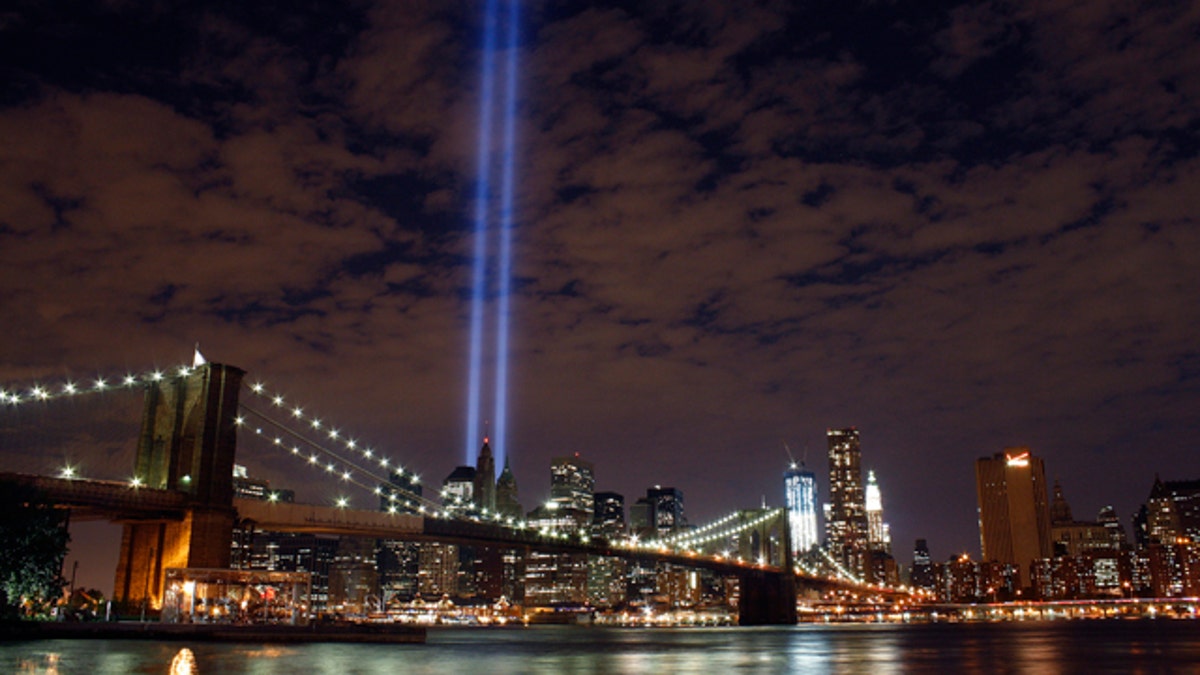
Sept 10: The Tribute in Light rises over the Brooklyn Bridge and lower Manhattan. (AP)
Fifteen years after the horrific attacks, the pain of 9/11 is as fresh as ever in New York, Washington and across the United States. But sadly, extremist brutality did not stop that day. From San Bernadino to Yemen, Paris to Bangladesh the reach of a sophisticated and persistent enemy has only grown.
The effects of Al Qaeda, ISIS, the Muslim Brotherhood, Iran and their proxies reach far into Europe, America and Asia. But in the Middle East, in the heart of the Arab world, we face an existential threat from extremism. Our communities, our families, our livelihoods, our entire way of life are exposed and under constant attack.
As the reach of extremism has expanded so too has the challenge in confronting it. U.S. power and leadership in the fight against extremism remains indispensable. However, now at risk, as never before, it is the UAE and America’s other Arab allies who are shouldering a greater role in the struggle.
This means using military force. This means stopping the flow of funds and fighters. This means challenging radical ideologies.
9/11 was a wake-up call for my country. The fact that two of the hijackers came from the UAE was alarming and unsettling. We realized that the radicalization of our youth was becoming a grave danger to our country, to the region and to the world.
9/11 was a wake-up call for my country. The fact that two of the hijackers came from the UAE was alarming and unsettling. We realized that the radicalization of our youth was becoming a grave danger to our country, to the region and to the world.
We instinctively understood that Muslims – moderate Muslims – must lead this battle for the future. We started first at home, moving aggressively against radicalization by reforming schools and curricula, offering clearer guidelines to religious leaders and providing better opportunities for our young people.
The UAE and other like-minded Arab nations also knew that we needed to attack extremist safe havens around the region and that this needed to be a shared fight with the U.S. and other allies. Shortly after 9/11, the UAE military joined the fight against Al Qaeda and the Taliban in Afghanistan and we remained on the frontlines there with the US and NATO for more than 12 years.
Today, it is the UAE and other Arab forces spearheading the fight against Al Qaeda in the Arabian Peninsula (AQAP), perhaps the most dangerous of all the Al Qaeda franchises. In April, our coalition launched a major offensive against AQAP in Eastern Yemen with the US providing critical support. Earlier in the year, UAE-trained and supported local forces also retook Aden, Yemen’s second largest city, from Iranian-backed rebels and other AQAP elements.
Our intensive hunt for the extremists also continues on the horn of Africa, where UAE forces work closely with the U.S. and others to degrade and destroy Al Shabab. In Syria and Libya and in other places across the region, UAE and other Arab militaries continue to work closely with the U.S. and other allies to attack other ISIS and AQ-linked extremists.
But the fight on the battlefield is only one of the fronts in this multifaceted war. Working with the US and other international partners, we are attacking the ideology of the extremists.
A joint UAE-US initiative, the Sawab Center is confronting the spread of extremism in social media and online. In another collaboration, Hedayah is an innovation lab for diverting young people away from radicalization, testing new intervention programs and developing new training courses for community leaders.
Working with Arab partners, we are also amplifying the moderate voices of Islam through institutions like the Muslim Council of Elders and the Forum for Promoting Peace in Muslim Societies. These scholarly bodies work on the global stage to clarify and correct Islamic ideology hijacked by the extremists.
In the UAE, we are advancing moderation in both our schools and places of worship. Our education system is built to reinforce Islam’s true values based on dialogue, tolerance, moderation, and peace. And in our mosques, we are modernizing the way Islam is taught, developing new training programs for imams and updating Koranic commentaries.
We also recognize the vital importance of skills training and job opportunities for youth at home and across the region to encourage their entrance into the workforce rather than let them fall prey to terrorist recruitment.
Fifteen years after 9/11, the long war against extremism continues. It is now a global fight against a borderless plague. While every country is at risk, today it is Arabs who have the most at stake. And it is Arabs who must lead in this fight for tolerance and humanity, with force and with ideas, where we pray and where we live, online, in the classroom and on the battlefield.
